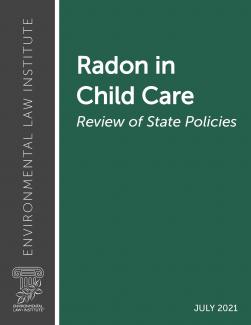
Indoor radon exposure is responsible for an estimated 21,000 lung cancer deaths in the U.S. every year. Radon gas can move from the ground to the air inside a building through cracks and other openings in the foundation. The only way to know the radon level in a particular building is to test the air in that building. Because elevated indoor radon levels have been found in all states, every state can benefit from establishing policies to promote radon testing and mitigation in child care facilities and other buildings.
This report discusses key features of a state policy and highlights 10 states that, as of 2021, required radon testing and/or mitigation in licensed child care centers and/or child care homes: Colorado, Connecticut, Delaware, Florida, Illinois, Iowa, Michigan, New Jersey, New York, and Rhode Island.
Overview of the Report
Most of the states profiled in the report established the following radon requirements through their child care licensing rules, though some adopted separate radon laws and rules implemented by public health agencies.
Radon Testing. In addition to requiring radon testing when a child care facility is first licensed, most of the policies reviewed here take the notable step of requiring periodic re-testing and/or testing in conjunction with building renovations. Nearly all establish mandatory or recommended procedures for conducting the required radon testing. While some of the states separately require licensing or certification of the professionals who conduct radon measurements, those licensing laws may have exemptions that would allow child care providers to test their own properties.
Radon Mitigation. Seven of the 10 states reviewed in the report have laws or regulations that explicitly require mitigation when radon levels in child care equal or exceed 4.0 pCi/L (EPA’s recommended radon action level). As with radon testing, several of the states require licensing or certification of those who perform radon mitigation, though licensing exemptions might allow a person to mitigate a building they own or occupy.
Radon Documentation and Notification. The states reviewed in the report oversee compliance with radon testing and mitigation requirements primarily by requiring child care providers to submit documentation of test results and/or to maintain this information on site and make it available for inspection. In some states, child care providers must post test results and/or notify families of elevated radon levels.
Since 2021, states have continued to adopt policies addressing radon in child care. Wisconsin is an example of another state that revised its child care licensing rules to include radon testing and mitigation requirements for family and group child care centers.
Explore other materials from ELI’s Indoor Environments Program.
© Environmental Law Institute®